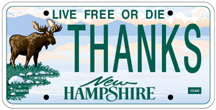Conservation License Plate Grant Program
The New Hampshire Division of Historical Resources provides grants under the Conservation License Plate Program, commonly called the "Moose Plate" program, for the conservation and preservation of significant publicly owned historic resources or artifacts that contribute to New Hampshire's history and cultural heritage.
The Division of Historical Resources (NHDHR) awards grants up to $20,000 for the preservation of publicly owned historic buildings and structures through the Conservation License Plate Grant Program. If you have any questions about the Division's Conservation License Plate Grant Program or have a project idea you would like to discuss please contact Amy Dixon at amy.s.dixon@dncr.nh.gov. To see which NH communities have received Conservation License Plate grants in the past, open the Moose Plate Grant Map.
2024 Moose Plate Grant Schedule
Please take a moment to first read the Grant Manual to understand the grant program and its requirements.
The Letter of Intent to Apply deadline has passed. Those who submitted eligible projects have been provided the application materials. Information about the 2025 grant round will be made available at a later date.
Full applications are due June 21, 2024, by noon.
If your project has the potential to disturb the ground near, around or under your historic building please consult the Archaeology Checklist for Grant Programs.
For more information about Conservation License Plates, go to mooseplate.com.
For more information about grants for the preservation and conservation of publicly owned documents from the New Hampshire State Library, visit the NHSL Moose Plate Grant Program webpage.
For more information about grants for the conservation of publicly owned artworks, artistic elements of publicly owned facilities, and improving access to historically significant artwork and arts programming from the State Council for the Arts please go to: State Arts Council Grant Information webpage.
What does the NHDHR Conservation License Plate Grant fund?
Projects that demonstrate adherence to the Secretary of the Interior Standards for the Treatment of Historic Properties.
- Preservation projects for publicly owned historic buildings, bridges, cemeteries and other historically significant resources that are eligible for, or listed to, the New Hampshire State Register of Historic Places or the National Register of Historic Places.
- Conservation, stabilization, and/or preservation of significant publicly owned archaeological sites.
- Projects that preserve historical properties owned by towns, cities, counties or by state agencies.
- Projects that do not request more than the $20,000 grant maximum.
What is not eligible for NHDHR Conservation License Plate Grant funding?
- Projects for privately owned historic resources.
- Archaeological research.
- Engineering studies or reports.
- Preservation projects that do not demonstrate adherence to the Secretary of the Interior Standards.
- Applications from any organization submitting more than one Conservation License Plate Grant application to the Division of Historical Resources for a project or projects in a single grant cycle.
- Applications from any organization submitting Conservation License Plate Grant applications to more than one of the Department of Natural and Cultural Resources' divisions for the same project or projects in a single grant cycle.
- Work that has been begun or completed, in any part, prior to Division of Historical Resources Conservation License Plate grant award approval.
- Construction of new buildings.
- Acquisition of collections or historic sites.
- Conservation of collections.
- Reconstructing historic properties (recreating all or significant portions that no longer exist).
- Moving historic properties or work on moved historic properties that are no longer eligible for listing in the State or National Registers of Historic Places.
- Cash reserves, endowments, revolving funds, or fund-raising costs.
- Lobbying or advocacy activities.
- Administrative costs.




